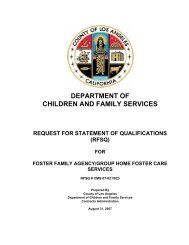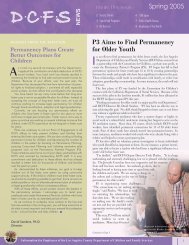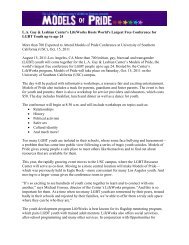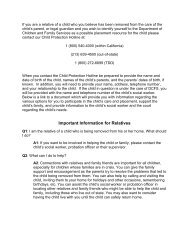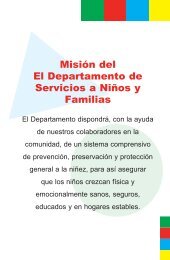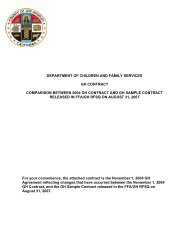Permanency Guide - Los Angeles County Department of Children ...
Permanency Guide - Los Angeles County Department of Children ...
Permanency Guide - Los Angeles County Department of Children ...
You also want an ePaper? Increase the reach of your titles
YUMPU automatically turns print PDFs into web optimized ePapers that Google loves.
CONSIDERING LEGAL GUARDIANSHIP<br />
Relatives and non-relatives may become legal guardians. Becoming a legal guardian involves a legal commitment<br />
and a Court order that changes the youth’s status from being a foster child. In most relative guardianship cases, the<br />
youth’s Juvenile Court Dependency is dismissed. While this commitment does not provide as high a level <strong>of</strong> legal<br />
permanency as adoption, legal guardianship is a viable option to be considered by families and youth.<br />
About Legal Guardianship:<br />
♦ Birth parent(s) can stay involved giving the child, in a sense, two sets <strong>of</strong> parents. This can be seen as a benefit<br />
for some families depending on their relationship with the birth parent(s).<br />
♦ Birth parent(s) may maintain the right to have reasonable visitation.<br />
♦ Birth parent(s) may have the right to petition the Court to regain custody if their circumstances change – this may<br />
be seen as either a positive or a negative.<br />
♦ Guardians may petition the Court to have the guardianship overturned or the guardian may go back to Court and<br />
request the child/youth be returned to the birth parent(s).<br />
♦ Relative legal guardians in California may be eligible for financial assistance through the Kin-Gap Program and a<br />
special rate may be considered, depending on the needs <strong>of</strong> the youth. This funding is based on the basic foster<br />
care rate, found on the table on page 26.<br />
♦ Non-relative legal guardians may be eligible for funding through foster care funding, and a special rate may be<br />
considered, depending on the needs <strong>of</strong> the youth.<br />
SOME QUESTIONS TO CONSIDER WHEN CONTEMPLATING A COMMITMENT TO A<br />
YOUTH, WITH A PLAN OF LEGAL GUARDIANSHIP:<br />
♦ Has permanency been explored with the youth and have the youth’s wishes and needs been considered?<br />
♦ With legal guardianship will the youth feel that they are a second class family member?<br />
♦ Will the youth fear being kicked out if they misbehave?<br />
♦ Are you making a permanent commitment to raise and be a lifelong<br />
family to the youth?<br />
♦ Do the birth parents still have rights?<br />
♦ Have reservations regarding committing to adoption <strong>of</strong> the child been<br />
fully explored?<br />
♦ Is this a permanent or conditional commitment?<br />
♦ Have the various options been explored with the youth?<br />
♦ Is there a hope that the youth will ultimately be reunified with their birth<br />
parents?<br />
♦ Is reunification an expectation by the caregiver and if so, is the<br />
guardianship a temporary commitment?<br />
♦ If the child reunifies, what happens to the guardianship and financial<br />
support?<br />
♦ Although a legal guardianship relationship legally ends at age 18, is the<br />
existing relationship still a lifelong commitment to the youth?<br />
“I think if I had a role model in my life, or just a man figure to give me knowledge he had as<br />
a young man, that would have really meant a lot, made me a better person.”<br />
-- Anonymous foster youth<br />
10



